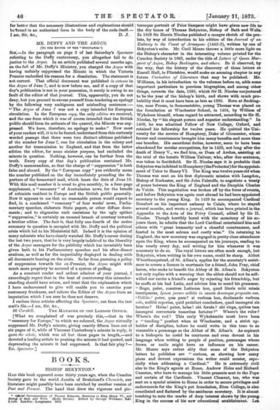MR. DUFFY AND THE ARG US.
(To THE EDITOR OF THE " SPECTATOR.")
SIR; —In the paragraph on page 3 of last Saturday's Spectator referring to the Daffy controversy, you altogether fail to do justice to the Argus. In an article published several months ago, on the fall of Mr. Duffy's Ministry, you charged the Argus with having unfairly suppressed the Minute in which the Victoria Premier embodied his reasons for a dissolution. The statement is not correct. That official' document was published in extenso in the Argus of June 7, and is now before me, and if a copy of that day's publication is not in your possession, it surely is owing to no fault of the editor of that journal. This, apparently, you do not deny, but you proceed to excuse yourself from tendering an apology by the following very ambiguous and misleading sentences :— " The Argus of June 7 was not a copy intended for European circulation. In the European copy, the only edition we received, and the one from which it was of course intended that the British public should form its estimate of the quarrel, the Minute was sup- pressed. We have, therefore, no apology to make." Now most of your readers will, it is to be feared, understand from this curiously worded passage that there were two distinct editions published of the number for June 7, one for circulation in the colony and another for transmission to England, and that from the latter edition the editor, for sonic sinister purpose, had excluded the minute in question. Nothing, however, can be further from the truth. Every copy of that day's publication contained Mr. Duffy's memorandum, so that the charge of " suppression " is both false and absurd. By the " European copy " you evidently mean the number published on the day immediately preceding the de- parture of the homeward mail, which bears the date of June 18. With this mail number it is usual to give monthly, in a four-page supplement, a " summary " of Australasian news, for the benefit of colonists resident in Europe and the British public generally. Now it appears to me that no reasonable person would expect to find, in a condensed " summary " of four weeks' news, Parlia- mentary speeches, elaborate State papers, or other diffuse docu- ments ; and to stigmatise such omissions by the ugly epithet "suppression," is certainly an unusual breach of courtesy towards a brother editor. The fact is, that fully one-fourth of the entire summary in question is occupied with Mr. Daffy and the political crisis which led to his Ministerial fall. Indeed it is the opinion of many colonists who have closely watched Mr. Duffy's career during the last two years, that he is very largely indebted to the liberality of the Argus managers for the publicity which has invariably been given both to his Parliamentary speeches and his after-dinner orations, as well as for the impartiality displayed in dealing with all documents bearing on the crisis. So far from pursuing a policy of suppression towards the ex-Premier, the Argus might with much more propriety be accused of a system of puffing.
As a constant reader and ardent admirer of your journal, I exceedingly regret that in the heat of controversy this misunder- statiding should have arisen, and trust that the explanation which I have endeavoured to give will enable you to exercise your customary frankness, and relieve the Editor of the Argus from an imputation which I am sure he does not deserve.
I enclose three articles affecting the Spectator, cut from the last mail's file.--I am, Sir; &c.,
26 Cornhill. THE MANAGER OF THE LONDON OFFICE.
[What we complained of was precisely this,—that in the " summary for Europe," to which we referred, the Argus virtually suppressed Mr. Duffy's minute, giving exactly fifteen lines out of six pages of it, while of Viscount Canterbury's minute in reply, it gave the whole, which was all but three pages in length,—and devoted a leading article to praising the minute it had quoted, and deprecating the minute it had suppressed. Is that fair play?— ED. Spectator.]


































 Previous page
Previous page